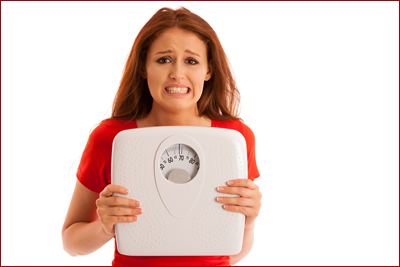How to Break Through a Weight Loss Plateau

Achieving your goal weight can be tough. While weight tends to come off fairly rapidly at first, at some point it seems as though your weight won't budge. This inability to lose weight is known as a weight loss plateau or stall, and it can be frustrating and discouraging.
However, several strategies can help you begin to lose weight again. Here are some tips to break a weight loss plateau.
Cut Back on Carbs
Cutting back on highly processed carbohydrates especially, will reduce the possibility of blood sugar spikes. Keeping your blood sugar at an even rate lowers the possibility of an insulin response with subsequent fat storage. That blood sugar will be more likely to be used by your body for energy rather than being stored as fat.
Don't Skimp on Protein
If your weight loss has stalled, increasing your protein intake may help. First, protein boosts metabolic rate more than either fat or carbs. This has to do with the thermic effect of food, or increase in metabolism that occurs due to the digestion of food. Protein digestion boosts calorie burning by 20 - 30%, which is more than twice as much as fat or carbs.
Second, protein stimulates the production of hormones, such as Peptide YY, that help reduce appetite and make you feel full and satisfied.
Manage Stress
Stress can often put the brakes on weight loss. In addition to promoting comfort eating and triggering food cravings, it also increases your body's production of cortisol. Cortisol is known as the "stress hormone." While it helps your body respond to stress, it can also increase belly fat storage. What's more, this effect seems to be stronger in women.
Therefore, producing too much cortisol can make weight loss very difficult.
It may seem as though you have little control over the stress in your life, but research has shown that learning to manage stress can help promote weight loss. Simple things like deep breathing or going for a walk can help reduce stress, as can exercise.
Eat More Fibre
Including more fibre in your diet may help you break through a weight loss plateau. This is especially true for soluble fibre, the type that dissolves in water or liquid. To begin with, soluble fibre slows down the movement of food through your digestive tract, which can help you feel full and satisfied.
Another way that fibre may aid weight loss is by decreasing the number of calories you absorb from other foods.
Drink Water, Coffee or Tea
While sugary beverages lead to weight gain, some beverages may help reverse a weight loss stall. Studies have found that plain water can boost metabolism by 24 - 30% for 1.5 hours after drinking a 500 ml serving.
This may translate into weight loss over time, especially in those who consume water before meals, which may help reduce food intake.
Coffee and tea may also benefit your weight loss efforts, as long as a natural low-calorie or zero calorie sweetener is used. These beverages typically contain caffeine, which has been shown to increase fat burning and boost metabolic rate by up to 13%. In addition, green tea contains a specific antioxidant which was found to boost fat burning by 17% in one study.
Get Plenty of Sleep
Not getting enough sleep can lead to weight gain by lowering your metabolic rate and altering hormone levels to drive appetite and fat storage. In fact, not getting enough sleep may be a major contributing factor in cases of stalled weight loss.
To support weight loss and overall health, aim for 7–8 hours of sleep per night.
Be as Active as Possible
Although working out is important, other factors also influence the number of calories you burn each day. For example, your metabolic rate increases in response to fidgeting, changing posture and similar types of physical activity. These types of activity are known as non-exercise activity or NEAT.
One study found that compared to lying down, people's metabolic rates increased by an average of 54% when fidgeting while seated and a whopping 94% when fidgeting while standing. An easy way to increase your NEAT is by standing up more often, including using a standing desk.
Don't Rely on the Scales Alone
When trying to lose weight, hopping on the scale is likely part of your daily routine. However, it's important to realise that the scale reading may not accurately reflect your progress, such as changes in your body composition.
Rather than weight loss, your goal is actually fat loss. If you're working out regularly, you may be building muscle, which is denser than fat and takes up less room in your body. So if the scale weight isn't moving, you could be building muscle and losing fat, yet maintaining a stable weight.
In addition, you may retain water for a number of reasons, including your dietary choices. However, the most common reason involves changes in hormone levels that affect fluid balance, particularly in women.
Also, instead of focusing solely on the number on the scale, assess how you feel and how your clothing fits. It's also a good idea to measure yourself on a regular basis to help keep yourself motivated when your weight loss seems to have stalled.

